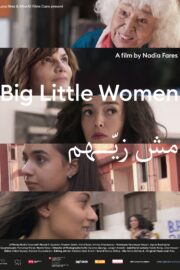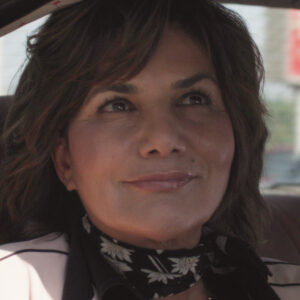Big Little Women
How does one speak lovingly about feminist struggles with an enlightened patriarch? The filmmaker uses a very personal poetic formula to transform the homage to her beloved Egyptian father into a chronicle of the status of women in Egypt and Switzerland. She explores the effects of patriarchal tradition by mirroring the Orient and the Occident.
Cast
- Nawal El Saadawi
- Nawal El Saadawi
- Nouran Salah
- Nouran Salah
- Noha Sobh
- Noha Sobh
- Amina Alwahany
- Amina Alwahany

Big Little Women
Nadia Fares
- Documentary
- Production Country / Year
- Switzerland, Egypt 2022
- Language
- ar., engl., gsw. OF m. dt. UT
- Format
- DCP, Color, 86min
1.78:1 (16:9), Discrete 5.1
Director & Crew

Nadia Fares
Born in Berne/Switzerland. Studied Film and Television at New York University Tisch School of the Arts. Active as a director, writer and producer.
Filmography
| 1999 | Spring break | Kurzfilm | |
| 2003 | Small differences | Spielfilm | |
| 2011 | Expectations | Kurzfilm | |
| 2012 | The recruited | TV-Dokumentarfilm | |
| 2013 | Hit man for rent | TV-Dokumentarfilm | |
| 2015 | Girlsgowheels | Kurzdokumentarfilm | |
| 2017 | Checkpoint tunisia | TV-Dokumentarfilm | |
| 2018 | The journey of geckos | Kurzdokumentarfilm | |
| 2019 | Swiss stories in los angeles | TV-Dokumentarserie | |
| 2022 | Big little women | Dokumentarspielfilm | 2022 |
"In its form, my film appears to be a tribute to my father, but in fact, I am honoring the courage of all women fighting for equal rights. By marrying an African man, my mother broke a taboo that was still very strong in Switzerland in the 1950s and 1960s. She paid for this transgression when my maternal grandfather, the Swiss patriarch of the story, conspired to have this undesirable husband deported, tearing apart my parents and my whole family. In Switzerland, as in Egypt, a patriarch often has the authority to crush the fate of the women in his family. Using my own story, I show two sides—which are mirror images—of the patriarchal system.
Nadia Fares
- Writer
- Nadia Fares
- Director of Photography
- George Kotta Kerollos
- Editor
- Chloé Seyssel
- Sound
- Ramzy Zakka
- Music Composer
- Alain Frey
- Producer
- Véronique Vergar
- Mohamed Fares
- Luna Films